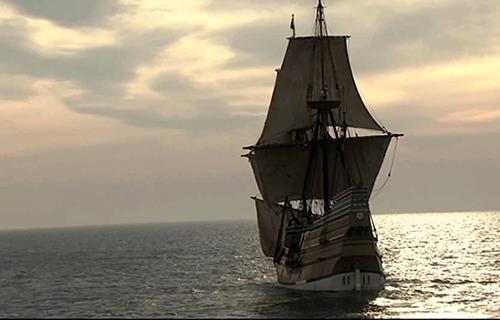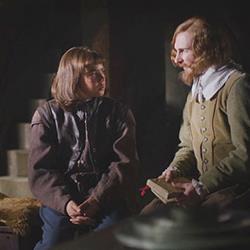
If you choose to gather 'round the telly after your Thanksgiving gorge, Ric Burns’ The Pilgrims (PBS's The American Experience, Thursday at 9:30 p.m. ET; check local listings) is a great way to spend 90 minutes. Beautifully crafted, it offers a nuanced account of the Puritans’ journey to Plimoth (present-day Plymouth, Massachusetts), their broader struggle, and a bit about the origins of the holiday.
But that is not the project’s promotional hook. The promotional hook is to “completely transform how we look at Thanksgiving holiday” (per PBS’s promotional material), to show us a Thanksgiving feast that “almost certainly never took place the way we imagine it did.” The Pilgrims doesn’t deliver on those claims, or at least does so in partial and sometimes confusing ways. So it’s a great story, but not a revelatory one.
The lynchpin of the story is William Bradford, who led a group of dissenters from the Anglican Church of England first to Holland in 1609, then across to the New World in 1620. Backed by investors, they sought not only to establish a purer religious community, but also to escape King James’s growing intolerance of Separatists. Roger Rees, who passed away after the filming, gives a stunning interpretation of Bradford – grizzled and wan from hunger, tormented by the colony’s travails, dedicated to the mission to his very core.
The show’s dramatic centerpiece is the Mayflower’s brutal Atlantic crossing (Sept. 6 – Nov. 9), at an average speed of 2 mph, followed by that even more brutal first winter, which claimed the lives of half the 102 erstwhile settlers (not all of them Puritans), and nearly ended the whole venture. The terrain where the Pilgrims settled, seemed uninhabited at first, because diseases carried over a few years earlier by white fishermen and traders had decimated the native population, especially the local Patuxet.
But the Pilgrims soon encountered and befriended the Wampanoags, who traded some goods, helped them plant spring crops – yes, including corn – and showed up one day for what turned into a nice impromptu dinner – later dubbed Thanksgiving. Yet relations with the Indians deteriorated to the point that Myles Standish beheaded an Indian warrior and posted the head on a pole outside the gates of the now fortified colony “for terror unto others,” as Bradford recorded in his official history of the settlement.
With the possible exception that the first Thanksgiving was probably spontaneous rather than a ceremony of gratitude, this outline of the Pilgrim’s saga is pretty standard. It had never been told on film as well, to be sure. For talking heads, Burns rounded up the distinguished Harvard historian Bernard Bailyn and his talented colleague (and New Yorker columnist) Jill Lepore, several British and American writers, and the rather mysterious (no web trail) and insightful “literary critic” Linda Donegan.
Like his even-more-famous brother, Ken, Ric Burns is so militantly opposed to the frenzied, quick-cut sensibilities of contemporary film that every pan is slow, every recitation by Bradford subdued and reflective, and the score by Brian Keane is almost hypnotic. All of which, combined with the tryptophan in turkey, may well put half of this Thanksgiving’s viewers to sleep before the second half.
 As historical revisionism, it’s hard to tell from the film’s claims. The PR materials cite the difficulty of the journey, the Pilgrims’ checkered relations with local tribes, and the “commercial nature of the venture.” Textbooks have recounted these realities for decades; perhaps Burns’ straw man is the version of history he learned in elementary school. (The venture was, for its backers, commercial, but decidedly religious for its voyagers.)
As historical revisionism, it’s hard to tell from the film’s claims. The PR materials cite the difficulty of the journey, the Pilgrims’ checkered relations with local tribes, and the “commercial nature of the venture.” Textbooks have recounted these realities for decades; perhaps Burns’ straw man is the version of history he learned in elementary school. (The venture was, for its backers, commercial, but decidedly religious for its voyagers.)
Another theme is Bradford’s disappointment that the colonists didn’t remain an insular, devout community as settlers were drawn to more and more distant farmlands. Yet students of New England Puritanism know that such laments about declension (which gave rise to the church’s “half-way covenant”) were endemic to the movement throughout New England.
Still, The Pilgrims offers an intriguing story within a story. “Of Plymouth Plantation,” Bradford’s account of the settlement from 1621 to 1646, disappeared in 1776 and was not relocated until 1855, when U.S. sectional strife threatened civil war. The Plymouth settlement had been nearly forgotten. But Bradford’s account offered the North a counternarrative of the nation’s official founding to the South’s claim that it all really began with the settlement of Jamestown colony in 1607. In other words, according to The Pilgrims, Bradford’s largely celebratory account gave us the distorted view of Plymouth and Thanksgiving we hold today.
Again, overreach. The textbooks talk about late 15th century European-Native American encounters; of the failed settlement at Roanoke (1585); and of Jamestown and Plymouth, both suffering dying times but ultimately persisting thanks to cash crops. And for many years, of course, it has been impolitic to talk of any white settlement as the “beginning” of the nation.
Ironically, The Pilgrims plays to – one might even say exploits – another great America trope while claiming to debunk a different one. That is the trope of the great seaward passage – as I said, this film’s dramatic center. The fact is, the Pilgrims lost only two souls on their trans-Atlantic voyage, making it a less deadly crossing than most by free people or indentured servants, and nowhere nearly as terrifying and fatal as the “middle passage” to the New World endured by millions of Africans over several centuries.
This is not to take away from the courage and suffering of Bradford’s devotees. Indeed, in an age of massive refugee migrations, The Pilgrims possesses more resonance about a very global saga rather than a distinctively American one.